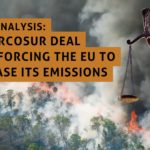To EU Energy and Climate Ministers, 27 October 2020
Climate Action Network (CAN) Europe is Europe’s leading NGO coalition fighting dangerous climate change with over 170 member organisations active in 38 European countries, representing over 1.500 NGOs. ClientEarth is an environmental law charity with offices in London, Brussels, Warsaw, Madrid, Berlin and Beijing. ClientEarth uses the power of the law to protect people and the planet. Friends of the Earth Europe is the European branch of the world’s largest grassroots environmental network, Friends of the Earth International. It includes 32 national organisations and thousands of local groups in Europe.
We are writing because the European Commission and EU Member States are currently discussing the EU common position regarding one of the 25 negotiation topics for the modernisation of the Energy Charter Treaty (ECT), namely the Definition of Economic Activity in the Energy Sector. We would like to use this letter to state our position on this matter.
The EU has a crucial role to play in addressing the climate emergency. In order to achieve coherent policy and legislative results, the EU must align the ECT with international climate goals under the Paris Agreement and its European Green Deal. The revision of the Definition of Economic Activity in the Energy Sector provides an opportunity to align the ECT to climate obligations and remove certain risks the ECT poses for climate action. In order to achieve that, the following two elements are crucial.
First of all, fossil fuel investments must be excluded from the definition of activities that are protected by the ECT. For greater clarity, we mean all fossil fuel investments – existing and future – and all types of fossil fuels, including natural gas.
This is a requirement to avoid that investors will use the ECT to obstruct the implementation of various commitments of states related to international, national and European laws for nature, environment and climate protection, including the Paris Agreement and the Green Deal. As recent cases already demonstrate, the ECT could delay necessary transition measures like the phase-out of coal, oil and gas, or make it expensive for taxpayers, beyond what would be required under domestic and EU law. For example, the owner of a coal-fired power station has been using the ECT to threaten the Netherlands with a compensation claim for its decision to phase out coal for electricity production by 2030.
We are therefore pleased to see that the European Parliament included in the European Climate Law an amendment that calls for the exclusion of fossil fuels from the protection under the Energy Charter Treaty. In a statement to the European Parliament on 22 October, Commissioner Kadri Simson confirmed that it is the European Commission’s intention to end protection for fossil fuels.
Both the European Parliament and the European Commission thereby recognise that ending the investment protection for fossil fuels is necessary to ensure consistency with the European Climate Law itself but also other recent EU policies within the Green Deal. EU Member States should follow this recommendation and support phasing out fossil fuels from the scope of protection under the ECT as soon as possible to allow the EU to meet its 2030 climate targets.
Secondly, there should be no expansion of the scope of the treaty, be it for renewable investments or for fossil investments. We therefore urge the EU not to add “new technologies and new investment trends” or similar language to the definition of economic activity or add new items such as hydrogen and biomass to the list of energy products and materials that are protected under the ECT. The reasons are:
● An expansion of the scope of the treaty is not needed to attract investments in renewable energy. In fact, studies reveal there is no conclusive evidence that the existence of investment treaty protection increases investment flows. (See eg OECD working paper)
● Any expansion would increase the risk of new ISDS cases. Given the many flaws of this old ISDS system – which are recognised by the European Commission and Member States themselves – it would be inconsistent to consider expanding access to ISDS. Any reform of the ISDS provisions as part of the ECT modernisation are unlikely to happen despite the repeated attempts by the EU to put ISDS reform onto the agenda, which has been opposed by Japan from the beginning.
● We would also like to caution that not all technologies and fuel types that fall under “new technologies and investment trends” are per se clean. For instance, the overwhelming majority of today’s hydrogen investments use fossil energy. This risks making the list of protected fossil fuel investments even longer, and potentially unpredictable.
● Governments could be dissuaded from introducing renewable energy subsidies if changes to these subsidies can be targeted with ECT-based claims. This is particularly true given the limited chances to reform the extensive privileges that the ECT grants to investors.
But even if the Definition of Economic Activity in the Energy Sector were to be revised according to the two elements above (exclusion of fossil fuels and no further expansion of the scope), there remain a number of other issues that would need to change in order to ensure that the ECT can no longer constitute an obstacle to the clean energy transition1.
If the reform process has not made considerable progress in the near future to fully align the ECT with climate and energy transition policies, we urge EU Member States and the European Commission to consider and come up with concrete proposals for a joint withdrawal.
Yours sincerely,
Wendel Trio
Director – Climate Action Network (CAN) Europe
On behalf of
Jagoda Munic, Director – Friends of the Earth Europe
James Thornton, CEO – ClientEarth
For more details, see N. Bernasconi-Osterwalder and M.D. Brauch (2019). Redesigning the Energy Charter Treaty to Advance the Low-Carbon Transition. TDM.

